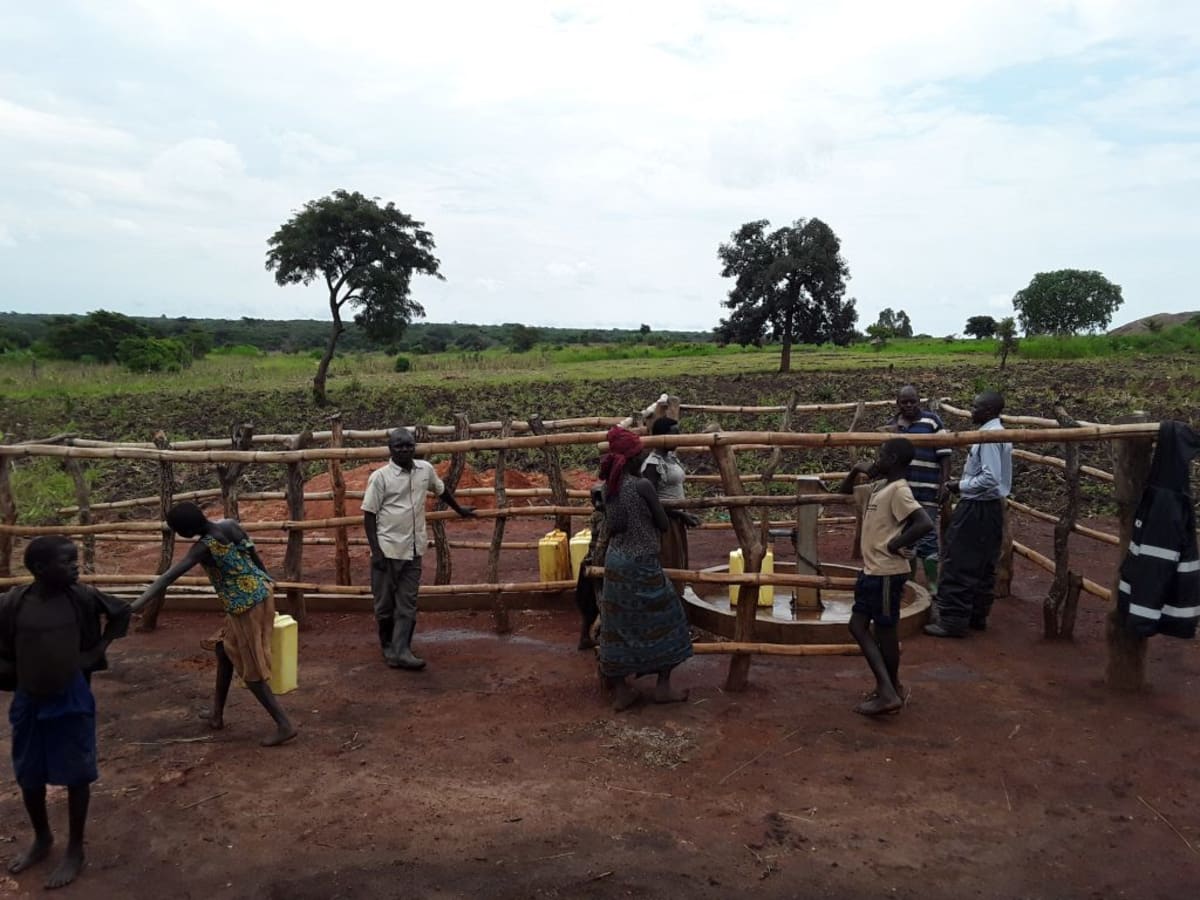Welcome to the Community
This hand-dug well will be installed in Karungu, Akiba North, Kiryandongo, Uganda. At this stage of the project, GPS coordinates are a rough estimate.
Akiba is home to around 50 households who form a community of almost 250 people, all who rely on dirty surface water for their daily needs.
Most community members wake up at 5AM to milk their cows. These farmers are paid a small fee to distribute that fresh milk to those in their community who don’t have cows. Everybody is tending to their own plots of land by 7AM, farms which are primarily planted with maize and sunflowers. After a full morning of work, women return home to beat the heat of the afternoon sun. The men, however, take the cows and other animals out to graze. After dinner, men usually gather in the center of town to socialize and drink. The women return to their gardens in the evening cool.
Water Situation
The surface water source closest to the village is a small, unprotected spring. This spring is out in an open field, and is thus also open to many different kinds of contaminants. Logs are suspended over the spring so it can be crossed, and so that women and children can balance on them while they fill their containers. However, women and children are often seen stepping directly into the spring to fill their plastic jerrycans.
Animals are often brought to this spring for grazing, sharing the water with humans. When it rains, even more contaminants are washed into the water. Drinking this water results in waterborne diseases like typhoid, especially among young children.
There is plenty of water in this spring, but it is constantly dirtied by the sources described above. Helping this community dig a well will provide them with a protected source of safe drinking water.
Sanitation Situation
Many families have pit latrines, but there’s still a handful that do not. The latrines we were shown are in poor condition, most of them about to collapse. As we begin to construct the hand-dug well, we will continue to encourage and help each family have their own latrine. Without good facilities, locals are forced to seek the privacy of bushes.
The Uganda program requires that every household has and uses a basic pit latrine before the pump handle is installed. Clean water does not go far if it cannot be kept clean at the household level.
Plans: Hygiene and Sanitation Training
Training’s main objectives are the use of latrines and observing proper hygiene practices, since these goals are inherently connected to the provision of clean water. Open defecation, water storage in unclean containers and the absence of hand-washing are all possible contaminants of a household water supply. Each participating village must achieve Open Defecation Free status (defined by one latrine per household), prior to the pump installation for a shallow hand-dug well.
This social program includes the assignment of one Community Development Officer (CDO) to each village. The CDO encourages each household to build an ideal homestead that includes: a latrine, hand-washing facility, a separate structure for animals, rubbish pit and drying rack for dishes.
We also implement the Community Led Total Sanitation (CLTS) approach with each of our village partners. This aims to improve the sanitation and hygiene practices and behaviors of a village. During these sessions, village leaders naturally emerge and push the community to realize that current practices of individual households – particularly the practice of open defecation– are not only unhealthy, but affect the entire village. CLTS facilitates a process in which community members realize the negative consequences of their current water, sanitation and hygiene behaviors and are inspired to take action. Group interactions are frequent motivators for individual households to: build latrines, use the latrines and demand that other households do the same.
Plans: Hand-Dug Well
The community will participate in excavating and constructing the water source. In the meantime, the aim is that all households own an improved latrine. Many households do not use a latrine but use the bush. Due to open defecation, feces are spread all over the village. This leads to waterborne diseases and contamination of groundwater and surface water. Our aim is that the community is able to live a healthy life free of preventable diseases. We endeavor that at the end of our presence in the community, people will have both access to sustainable, clean water and access to sanitation. We have now organized families to form digging groups for latrine construction, and empowered them with tools to use.
Actual well construction will take four to six weeks if there are no challenges. The well will be lined with bricks and sealing clay, and finished with a Consallen pump.
When Mr. Albino Okema heard about this project, he confirmed the need. "The community is highly populated with limited water points, so getting a water point from you is really good news," he said.
Thank You for partnering with us to get clean water to the people living in Karungu!

 Protected Dug Well
Protected Dug Well
 Rehabilitation Project
Rehabilitation Project




















